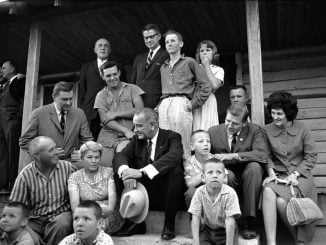
Sometimes seemingly easy questions are the most difficult to answer. For instance, have you ever asked: “What is the United States?”
Many people think they know the answer and have dogmatic opinions. Yet ask them a few follow-up questions demanding answers that require an explanation or that go beyond parroting a few sound bites. People are left befuddled.
It is truly a difficult question to answer, and many times, our definition is linked to our definition of patriotism.
Many believe the United States is primarily an idea and subscribe to an American creed that is continually progressing. Others believe that the United States is a place with a particular culture, informed by many distinct yet assimilated cultural influences. These two can be in tension, but they are not mutually exclusive.
The titles of history texts can reveal whether an author is influenced more by the abstract or the particular, or put another way, by a creed or by a nation. Here is an incomplete list, without respective subtitles:
- Unto a Good Land
- A Patriot’s History of the United States
- A People’s History of the United States
- Give Me Liberty
- Voices of Freedom
- A History of the American People
- Out of Many
- Unfinished Nation
In many ways, differing definitions of America resulted from a longstanding intellectual schism during the 1700s Enlightenment: Skeptical and Radical. (There were other Enlightenment schools, too). Many historians argue there was a distinct American Enlightenment that combined elements of the two.
A Burkean would argue, for example, that America is an “extension of European and especially British laws, institutions, and religious beliefs.” As historian Wilfred McClay relays, that is a good question to ask. Does also common American history, legal tradition, and shared experiences unite us?
Intellectual descendants of the Radical Enlightenment would argue that America is a nation built primarily upon abstract principles. So, suggests McClay, another good question is whether America is a “post-ethnic nation built upon universal individual rights” rather than, for example, tradition, conventions, and language.
Let’s take the query further. Is America both a creed and a particular nation? Is America, asks McClay, “distinctive?”
The United States is based on the abstract and particular, a creed and a nation.
Let’s consider the Declaration of Independence. It declares, “All men are created equal, and bestowed by their Creator with certain unalienable Rights . . . Life, Liberty, and the pursuit of Happiness.” The notable part of the “American creed” is located near the beginning. This is one of two precepts commonly invoked by Americans—the other being America is a “government of the people, by the people, and for the people.”
The Declaration of Independence was not simply the product of abstract thinking. The document was also a product of shared experiences across the American colonies and a growing sentiment of the people. A list of 27 grievances is in the middle part of the document. (It must be remembered that, in North Carolina alone, the Halifax Resolves, the Mecklenburg Resolves, the Martinsborough Resolves, and similar declarations preceded the Declaration of Independence.)
America’s founding document, the Declaration of Independence, then, is a mixture of the abstract and the particular, a creed and a nation. American patriotism, then, can be a combined belief in a creed and an acknowledgement of shared experiences, with a devotion to the particular and the nation.
If America is only a creed, it is easy to point out hypocritical “sins” and let the defects distract from the whole. Critics often fail, as McClay writes, to “weigh America’s problems on the scale of all human history.”
A devotion to the particular—as evidenced by a love for family or appreciation for Burkean “small platoons,” those local associations and institutions, Americans hold dear—can foster patriotism for the nation, and thereby a creed.
A few days ago, I saw a fellow wearing a T-shirt. On the back, was a picture of John Wayne, and a quote: “Sure, I wave the American flag. Do you know a better flag to wave?” America has faults that we try to learn from, but it is our country.
Troy L. Kickler, Ph.D., is an alumnus of the University of Tennessee and N.C. A&T State University.



